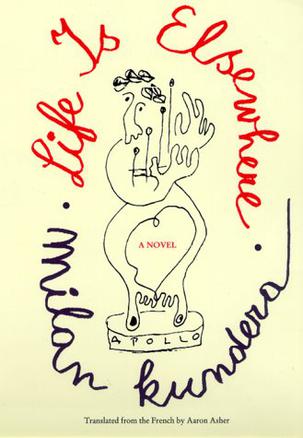-

Immortality
-

Life Is Elsewhere
The author initially intended to call this novel The Lyrical Age. The lyrical age, according to Kundera, is youth, and this novel, above all, is an epic of adolescence; an ironic epic that tenderly erodes sacrosanct values: childhood, motherhood, revolution, and even poetry. Jaromil is in fact a poet. His mother made him a poet and accompanies him (figuratively) to his love bed and (literally) to his deathbed. A ridiculous and touching character, horrifying and totally innocent ("innocence with its bloody smile"!), Jaromil is at the same time a true poet. He's no creep, he's Rimbaud. Rimbaud entrapped by the communist revolution, entrapped in a somber farce. -

Slowness
Two tales of seduction, separated by more than two hundred years, interweave and oscillate between the sublime and the comic in this, Milan Kundera's lightest novel. In the 18th century, the marvelous Madame de T. summons a young nobleman to her chamber and gives him an unforgettable lesson in the art of seduction and the pleasures of love. In the same chat at the end of the 20th century, a hapless intellectual experiences a rather less successful night. Distracted by his desire to be the center of attention at a convention of entomologists, Vincent misses the opportunity to be with a beautiful stranger and suffers the ridicule of his peers. A "morning-after" encounter between the two men brings the novel to a poignant close and provides a unique insight into the different mind-sets of the two centuries. As Vincent prepares to speed off on his motorcycle, he has already obliterated the memory of his humiliation. The young nobleman, on the other hand, relives the delicious pleasures of the night as he lies back on the cushions of his carriage. Ruminating on how the pleasures of slowness have disappeared in today's fast-paced, future-shocked world, Kundera explores the secret bond between slowness and memory and the connection between our era's desire to forget and the way we have given ourselves over to the demon of speed. As provocative as it is entertaining, "Slowness" is Kundera in top form. -

可笑的愛
◎共計有七篇短篇故事。七篇故事各自獨立,卻又巧妙相連;由極單純的人物、故事背景組成,串聯出七個荒謬、可笑、自作自受的以『愛』為主軸的人生景色。 『我知道你一向是個直爽的人,你自己對這一點很驕傲。可是,請你想想這個問題:『為什麼』要說實話?是什麼強迫我們這麼做?為什麼必須把誠實看做是一種美德?假設你遇到一個瘋子,他說他自己是魚,我們每一個人也都是魚。你會和他爭論嗎?你會在他面前脫掉衣服,好讓他看看你沒有魚鱗嗎?你會當他的面對他說你心裡真正想的嗎?你說嘛!』 他的哥哥沈默以對,艾德華繼續說:『要是你對他說實話,把你對他真正的想法告訴,他這意思就是說,你同意和一個瘋子進行嚴肅的對話,你同意你自己也是個瘋子。我們所處的這個世界正是這個樣子。如果你執意要當一個人的面說實話,這就表示你嚴肅的看待他。嚴肅的看待一件根本不嚴肅的事,意味著自己也要喪失自己的嚴肅我啊,我為了不要嚴肅看待瘋子,不要自己也變成瘋子,就『必須』說謊。』 -

The Book of Laughter and Forgetting
Kundera whirls through comedy and tragedy towards his central question: how does a person, any person, live today? In constructing his answer, he writes of politics, sex, literature, modern man's alienation - and of their antidotes: laughter and forgetting -

Ignorance